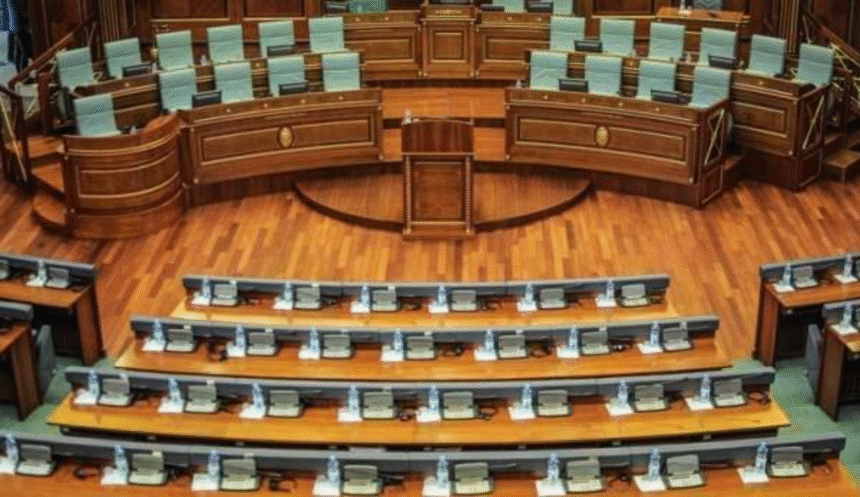The formation of the Kosovo Assembly has stalled over the election of the Serbian deputy speaker. After the Serbian List refused to change its candidate and their nominee failed to secure the necessary votes in three rounds, the Assembly Speaker decided that a new name would be determined by lottery. Nenad Rashiq, from another Serbian party, was also included in this process. Legal experts say these developments may conflict with the Constitution.
After electing the Speaker and three deputy speakers from the majority Albanian community, the Assembly still needed to elect two deputy speakers from non-majority communities: one from non-Serb minorities and one from the Serbian minority.
Unlike previous years, when these two positions were elected together, this year the vote was separated. Legal experts argue that this method is unconstitutional, but confirmation would require an appeal to the Constitutional Court.
Emilija Rexhepi, representing other non-Serb communities, was elected deputy speaker. The process then stalled on electing the deputy speaker from the Serbian community. The Serbian List, holding 9 of the 10 reserved Serbian seats in the Assembly, insisted on nominating Sllavko Simiq. He failed to secure the required 61 votes in three rounds.
As the Serbian List refused to propose an alternative candidate, Assembly Speaker Dimal Basha opted for a lottery, in accordance with the Assembly’s Rules of Procedure, to select another candidate from the Serbian community.
Constitutional and Procedural Considerations
Besides other Serbian List deputies, Nenad Rashiq from the “For Freedom, Justice and Survival” party—currently a minister in the caretaker government—was proposed. Rashiq also failed to obtain the necessary votes, and experts question the constitutionality of his possible election.
The Rules of Procedure state that “the candidate for deputy speaker from the Serbian community shall be proposed by the majority of the deputies of the Serbian community.” Meanwhile, the Kosovo Constitution stipulates that the deputy speaker “shall be elected from among the deputies who hold reserved or guaranteed Serbian community seats.”
Rashiq has stated that a potential election would not be unconstitutional, as he refers to the Constitution rather than the Assembly Rules. Speaker Basha, citing a Constitutional Court ruling, said each candidate may be voted on a maximum of three times.
Since no candidate was elected on August 26, the process continued on August 28, but the outcome remained the same. Vetëvendosje supported only Rashiq, but their votes were insufficient. The session was suspended and scheduled to continue on August 30, leaving Rashiq with one remaining opportunity.
Legal experts maintain that the process is unconstitutional. Ehat Miftaraj of the Kosovo Justice Institute explained that, according to the Constitution, Constitutional Court practice, and parliamentary norms, deputy speaker elections should be based on a written proposal from a candidate supported by the majority of Serbian community deputies. The lottery procedure is only acceptable if no candidate is proposed.
“Therefore, the lottery and voting process contradict the Constitution and Rules of Procedure. Any resulting decision is unconstitutional. Unfortunately, resolving this stage of the political deadlock may require intervention by the Constitutional Court,” Miftaraj said.
He added that Rashiq’s candidacy is entirely inconsistent with the Constitution, judicial and parliamentary practice, and the Rules of Procedure, as he lacks the majority or the required endorsements from Serbian deputies.
Implications if All Serbian Deputies Are Disqualified
The lottery process may continue, but if no candidate receives the 61 votes after three attempts, all Serbian deputies could be effectively disqualified.
“If no candidate obtains 61 votes, it creates a situation in which the Assembly cannot constitute itself. There is no provision for restarting the vote with the same candidates,” Miftaraj said.
The Serbian List has already indicated that it will appeal to the Constitutional Court. Eugen Cakolli from the Kosovo Democratic Institute warned, “It is becoming increasingly clear that the country is being intentionally pushed toward a new constitutional crisis, even deeper than the one over electing the Assembly Speaker.”
“With all possible Serbian community candidates exhausted—even though the procedure followed is not fully in line with Constitutional Court rulings—after the next session, the Assembly may have no reason to convene, as there will be no candidates left to propose.”
/REL/







